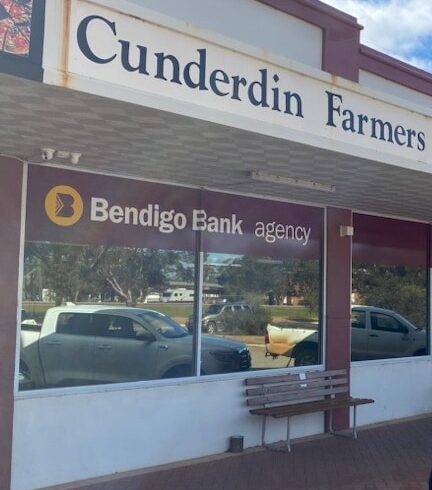
Since Bendigo Bank announced it will be closing 28 agency services across the country, residents in the small town of Cunderdin, 160 kilometres east of Perth, face the prospect of a 120km round trip for some banking services.
Bendigo Bank’s decision has left Cunderdin Shire president Alison Harris “hugely concerned and deeply disappointed”.
Alison Harris says banks are vital in small communities. (Supplied: Shire of Cunderdin)
The agency was run out of the town’s co-op service and was set up after Westpac left town.
Cr Harris said many people transferred to Bendigo Bank at the time and now faced the prospect of having to transfer again.
“A bit like doctors and grocery shops, the bank is vital in a small community,” she said.
“The crux of it is that Bendigo Bank markets itself as a community bank, and we just feel that this is not a community decision at all.”
In a statement, Bendigo Bank said it would shut down its agency model across 28 locations by October, citing “decreasing customer use”.
The bank’s service in Cunderdin provided the community with cash, floats for the footy, and other general banking.
Residents’ closest branch will now be either the town of York or Northam — a nearly two-hour round trip.
Bendigo Bank said customers would be connected with their closest alternate service.
The Cunderdin Bendigo Bank agency is one of 28 set to shut its doors. (Supplied: Samantha Pimlott)
Cr Harris said the decision to shut the Bendigo Bank agency would have ripple effects despite the town being able to access post office banking services.
“And once people do travel out of town, they may shop out of town, they may go to the doctor out of town,” she said.
“So it’s just further pulling away services that we want to provide in town.”
Cr Harris said that while some physical locations might be unprofitable for banks, she was concerned about elderly residents who lacked the digital know-how to conduct their banking online.
Banking in the bush
It is a problem the founders of the Indigenous-owned Traditional Credit Union (TCU) encountered 30 years ago in the Northern Territory as the big banks started to leave.
Traditional Credit Union is the only Indigenous-owned credit union in Australia. (Supplied: Traditional Credit Union)
“If you go into any community that has lost a bank, they will tell you exactly how devastating it is,” TCU CEO Simon Lyons said.
The credit union was formed on the island of Milingimbi after remote communities in the Top End had no access to banking facilities.
Simon Lyons with Traditional Credit Union staff on the Tiwi Islands. (Supplied: Traditional Credit Union)
“Big banks have got shareholders and they’ve got to answer to them,” he said.
“It’s costly to operate in remote communities.
“It’s very difficult, particularly up here in the Northern Territory, where a number of these communities are cut off in the wet season and access to them is limited quite often to fly-in.”
The Traditional Credit Union has a remote branch at Wurrumiyanga. (Supplied: Traditional Credit Union)
Mr Lyons said communities suffered when banks pulled out, and getting cash into those areas could become difficult for local businesses and groups.
“If you’re trying to run a sausage sizzle at the football and you’re collecting cash, you’ve got to have a place to put it, to be able to bank that cash,” he said.
“It sounds like a minor thing, but it is actually a major thing, along with the ability to actually go and talk to someone.”
Simon Lyons with Bunug Galaminda, who is on the Traditional Credit Union board of directors. (Supplied: Simon Lyons)
Cash still essential
Mr Lyons said services, such as opening or cancelling accounts or handing deceased estates, could only happen in branches, and closing locations could impact local jobs.
He said the community banking model worked, but also needed support.
“We’re the smallest bank in the country, but we’re regulated in exactly the same way as a Commonwealth Bank or a National Australia Bank,” he said.
“That regulation and compliance with that regulation come at a cost, and it isn’t proportional.”
Mr Lyons said smaller banks like TCU had the same regulatory requirements and the same cost impost without the same revenue flows and profit.
In February this year, Treasurer Jim Chalmers announced a moratorium on regional banking closures from the big four banks until July 2027.
Banks were also asked to increase their “commitment to and investment in regional banking”, with Bank@Post, that is banking at a post office, being one of the preferred options.
“I think government and others are recognising firstly that cash is an essential service and banking is also an essential service,” Mr Lyons said.
“Communities, despite their remoteness or the fact that they are regional, shouldn’t be deprived of that.”
Banks and councils
One solution that border communities in Victoria and New South Wales have adopted is the partnership between smaller banks and councils.
Hume Bank has partnered with Hume Council since 2005 and runs a branch inside the council office in Holbrook, New South Wales.
Hume Bank’s CEO, Stephen Capello, said residents in Holbrook would have to drive 45 minutes to the next town after the last bank closed down.
Stephen Capello says regional Australia needs a socially responsible banking industry. (Supplied)
He said while customer behaviour was evolving, regional communities were seeking “equitable banking services” alongside their metro counterparts.
“[There is a] strong belief that these services are required to underwrite the future of these small towns,” he said.
“I think regional Australia needs a socially responsible banking industry, and that needs to reflect some of the heavy lifting that small regional banks and community and customer banks are doing at the moment.”
In a statement, the Finance Sector Union said it had “deep concerns” about banks “unilaterally” making significant cuts to their service and regional communities.
The union said it was continuing to pressure the federal government on the issue of regional banking.
The union’s assistant national secretary, Nicole McPherson, said it had been 14 months since a Senate inquiry handed down a report calling for banking to be regulated as an essential service.
“It is critical that the federal government step in and protect bank workers and customers, given that the banks have proven themselves to be incapable of doing anything other than putting profits and shareholders first,” she said.
The Australian Banking Association declined to comment.





